
28 minutes, 31 seconds
-949 Views 0 Comments 0 Likes 0 Reviews

Stop the Steal 2.0:
HOW META AND TIKTOK ARE PROMOTING A COUP
STOP THE STEAL 2.0: HOW META AND TIKTOK ARE PROMOTING A COUP
Meta’s recommendation systems are driving Brazilian Facebook and Instagram users towards Stop the
Steal content, pages and groups that are intent on attacking Brazilian democracy, new SumOfUs research has found.
Meta claims that Brazil is a priority region and that the company is committed to enforcing policies and practices that uphold the integ- rity of the vote. But not only does SumOfUs‘ previous research show that the platforms are awash with conspiracy theories about the election, claims of electoral fraud, and calls for a military coup, this research report sets out how Facebook‘s recommender systems are actively pushing users towards this content.
Far right extremists, who are openly agitating for a military coup, are operating freely on Meta‘s platforms, and Meta is not only allowing them to spread their message and recruit new members,
but the platform‘s algorithms are prioritizing anti-democratic groups, accounts and posts. The report also looked at the role TikTok is playing in tackling the growing problem of election disinformation on its platform, and found its moderation lacking.
Some of the key findings of the report are:
The findings confirm civil society organizations‘ worst fears, that platforms like Facebook and Instagram are enabling bad actors to organize and recruit new members, just as it did in the US 2020 elec- tions, which ended in violent insurrectionists storming the US Capitol on January 6th.
Meta‘s algorithms, policies and tools handed leading figures in the US a platform to push their baseless allegations of election fraud to millions of new users. Facebook‘s recommended groups feature directly contributed to the rapid growth of Stop the Steal groups, bringing together the community that were then able to use the platform to fundraise and organize to overturn the election.
These findings are also corroborated by the latest statement from Brazil‘s Superior Electoral Tribunal President, who said social media platforms‘ performance is 'disastrous' by allowing disinformation
to go viral ahead of the second ballot, and is seeking police powers as a last resort to force the removal of disinformation and illegal content faster.
Over a 07 day period, researchers, using brand new user profiles, entered three neutral keywords into both Facebook and Instagram‘s search bars: ‚'fraud', 'intervention' and 'ballots'.
For Facebook, 63.6% of the posts recommended as part of the research were Stop the Steal content. While for Instagram, 58.8% of the recommended profiles and hashtags were pushing Stop the Steal content.
Throughout this research, we were able to collect evidence of how Facebook is actively recommending pro-coup and Stop the Steal- like content, pages and groups to users.

When researchers entered the word 'fraud' (fraude) into the search box, 05 out of the 07 top suggested groups provided by Facebook were associated with attacks on election integrity. The groups names explicitly align themselves with Bolsonarist Stop the Steal messaging, such as: "ballots suspected of fraud and irregularities - claims"; "rigged ballots"; "2022 elections fraud" ; "electronic ballots fraud" and so on.
When we entered the second simple search term, 'intervention'‚ (intervenção), 05 out of 07 recommended results advocate for military intervention in the upcoming elections. When we searched under the videos category with the same search term, 02 out of the top 05 promoted videos were demanding an armed coup.
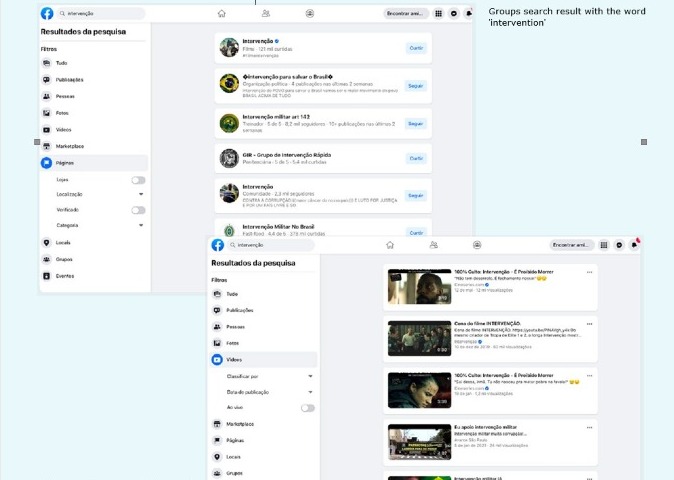

Delving deeper, when researchers entered a common phrase used by the far-right, "Military Intervention with Bolsonaro in power", in Facebook‘s search bar, it returned dozens of results of public and private groups, some with thousands of members. Here‘s a snapshot:

We conducted the same experiment on Instagram using the same three search terms. In the first keyword, 'fraud', all recommended hashtags were associated with the election‘s Stop the Steal. The explicit hashtag "#fraudintheballots" alone has over 21,000 posts

Taking a closer look at the posts being recommended when sear- ching under the broad hashtag "#fraud" the top six results are from Bolsonarists supporting the President or questioning the elections.
Using the keyword 'ballots' (urnas), 02 out of the 05 suggestions led users straight to toxic electoral content. The top result is the "#electronicballotsisfraud" hashtag, with over 3,000 posts, while "ballots fraud" is the recommended profile.

Digging deeper, if you click on the suggestion "electronicballotsis- fraud", you are led to a page that has over 3,400 posts. Of the top 06 results, all question the integrity of Brazil’s electoral process: 04 undermine the ballot system (the first one is a video of an influencer questioning the electronic ballots), one questions the accuracy of polling, and lastly, a fake news story alleges that a popular center-
right Congresswoman only voted for Lula because he blackmailed her.

When searching with the keyword 'intervention' (intervenção) 02
out of 06 results recommend accounts that call for a coup. The top recommended account is named "MILITARY INTERVENTION NOW".
If we accept Instagram‘s suggestion and click on "military intervention", it leads users only to Stop the Steal profiles and content associated with demands for a military coup. In the dropdown list, all six sugge- stions lead to Stop the Steal accounts. The recommended post offered by Instagram, says "Help Armed Forces we are being robbed!!!". In the post‘s hashtags it includes #militaryintervention.
Another example is a video where an influencer explains that the election results from the first round cannot be mathematically correct.

A look at CrowdTangle, shows Stop the Steal related content spiking sharply in the days immediately before and right after the first round of voting. As we approach the second ballot (Oct 30th), we can see a similar upward trajectory.
The researchers entered the key word "fraud" into CrowdTangle covering a two week timespan (25th September - 11th October), this includes the days leading up to and after the first ballot. The graphic below, pulled from CrowdTangle, shows a total of over 1 million interactions across 12,000 Facebook posts during that period. It would be unfeasible to check every single post, however, a scan
of all the top results reveals that they are all Stop the Steal-like content, pushing pro-Bolsonaro narratives.
It also shows that engagement with content about electoral fraud peaked two days after the first round (Oct 4th), with more than 345,000 interactions, and that the curve is rising again as the second round of voting approaches.
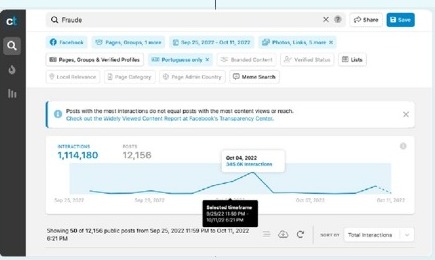
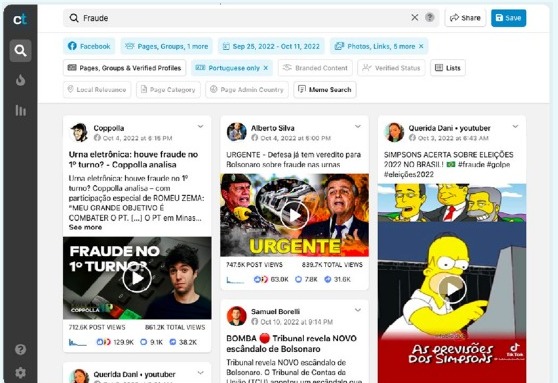
Mito 22 is one of the larger groups identified in our research, totalling 1.4 million members. The group amplifies Bolsonaro‘s rallying cry to reject the election outcome if he loses, and actively promotes calls for a military coup.
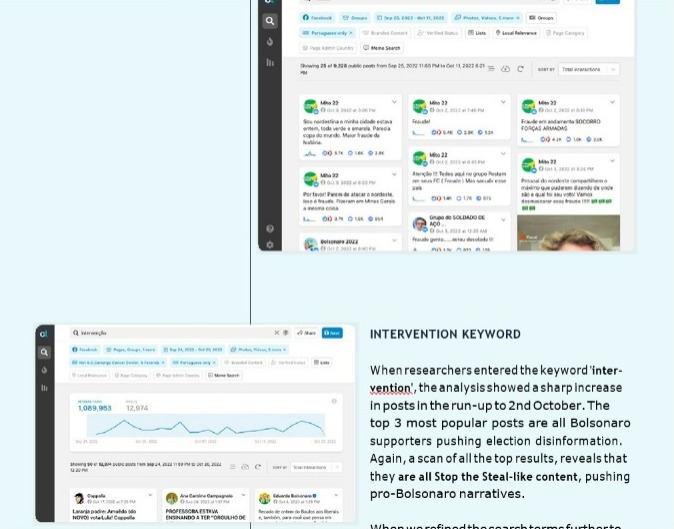
Finally when we entered the key search term "ballots fraud", we saw 150,000 interactions across 1500 posts, with engagement spiking in the days following the first ballot. And as for the other keywords, a scan of all the top results reveals that they are all Stop the Steal-like content, pushing pro-Bolsonaro narratives.
Here are some examples of popular posts containing "ballots fraud": 04 out of 05 top posts are promoting Stop the Steal related content.

CrowdTangle analysis shows how Meta platforms allow Bolsonaro‘s inflammatory rhetoric to reach hundreds of thousands of users, further fuelling election conspiracy theories and eroding public trust in the election outcome.
When Donald Trump spoke at an election rally or tweeted out accu- sations of a rigged election, Facebook‘s algorithm amplified his lies, giving him and his allies the ability to mobilize a movement to over- turn the election outcome.1
We can see a similar pattern in relation to Brazil‘s election. On 11th October, at a rally in the city of Pelotas, Bolsonaro made a series of outlandish claims about election integrity and called on supporters to occupy polling stations during the second ballot, foreshadowing a Capitol Hill-style uprising on election day. Bolsonaro‘s incendiary speech spread rapidly across Facebook2, with allies and supporters reposting widely, and generating almost 250,000 interactions with 669 posts in just one day.
As previous research has pointed out, TikTok is quickly becoming an engine of disinformation and toxic content. Growing rapidly since its launch in 2018, it now has over 1 billion users worldwide, Brazil being the third biggest market for the platform, with over 74 million users, or 45% of all adults in the country.
Just a few weeks ago, Folha de S. Paulo, one of Brazil‘s top newspa- pers, published an article showing that electoral disinformation
is running rampant on TikTok, racking up millions of views and interactions. Following the Folha article, TikTok appears to have implemented changes to safeguard against election disinformation in Brazil and these changes have had an impact. Researchers saw a drastic drop in recommended videos casting doubts about the elections, which is a welcome and clear sign that TikTok and other platforms can change their algorithms, policies and tools to help protect democracies around the world.
However, even with TikTok‘s adjustments to its recommendation system, we were still able to find toxic content on TikTok using the same three neutral terms used on Facebook, Instagram and
CrowdTangle, namely "ballots", "intervention" and "fraud". Although the system didn‘t recommend toxic content immediately, with simple variations of the terms, researchers were recommended vast amounts of Stop the Steal-like content.
Using the keyword "ballots" on TikTok‘s search box, 05 out of the 08 top recommended keywords question the integrity of the elec- tion results, such as: "rigged ballots", "Ballots being manipulated",
"adulterated ballots 2022", "Ballots at PT Union" and "ballots with 129 votes" (another popular electoral fake news story about mani- pulated ballots).
If we ignore the top recommended keywords and click on 'ballots', the search results serve up multiple problematic videos casting doubt on the electoral process. Amongst the 06 results labeled as "Best Videos", 04 videos raise questions about the electronic ballot system, and have totalled over 1.5 million views.
The search term 'intervention' produced similar results. 03 out of the 08 recommended keywords were associated with military inter- vention: "military intervention", "military intervention 2022" and "military intervention at elections".
Even after ignoring the recommended keywords, and insisting on the neutral search term 'intervention', TikTok‘s recommendation system still pushes users to toxic and illegal content. There were 02 out of 06 videos under the "Best videos" label which promote Stop the Steal-like content. One video, while the content itself is not calling for a coup,
is filled with hashtags such as #intervention, #elections2022, #bolso- naro2022, #arrestlula, #army. This one video alone has had over 4 million views6, 379k likes and over 22k comments and counting.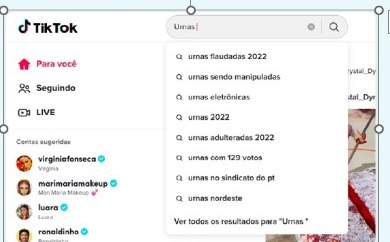
Our first report showed how extremists used the platform to allow anti-democratic groups to flourish in the run-up to Brazil Indepen- dence Day. The report showed how Meta was enabling bad actors to break Brazilian electoral law and even its own policies.
SumOfUs‘ follow-up report exposed how Meta and YouTube are pumping out extremist videos and ads, allowing a Stop the Steal narrative to take root, softening the ground for a possible challenge to the election outcome. Now this analysis shows how Facebook‘s search function is serving up results that are heavily skewed towards Stop the Steal associated content, and pushing users towards unfounded allegations about the election.
In addition, Facebook, Instagram and TikTok are acting as a mega- phone for Bolsonaro and his allies to agitate for an unfavorable election outcome to be overturned. The platform‘s algorithms and policies are enabling bad actors to organize and recruit new members, and seed their narrative of election fraud, softening the ground for a potential coup. We found videos, posts and groups reaching tens of thousands, sometimes millions of users with these
conspiracy theories and election lies. This coordinated effort by far- right forces to hijack the political conversation using platforms like Facebook, Instagram and TikTok should ring alarm bells with Meta and TikTok execs – given bad actors used exactly the same playbook platforms during the 2020 US election culminating in the shocking events of January 6th 2021.
In response to our previous research Meta says that it "won‘t shut down ads that discuss, debate, or advocate for election policies {and that a private company shouldn‘t} limit people‘s ability to discuss topics debated in the Brazilian Congress". This position in the context of the Brazilian election and Bolsonaro‘s Presidency is at best naive and at worst dangerous. It completely ignores that far right groups are openly agitating for a violent uprising on these social media plat-
forms, illegal under Brazilian federal law as well as pushing baseless conspiracy theories which are eroding public trust in the election. It‘s alarming that Meta frames this as part of a "policy debate".
There is still time for Meta to take action and stem some of the damage. Meta, Google, and TikTok must urgently follow the recom- mendations of 90+ Brazilian and international civil society organiza- tions, including SumOfUs, by:
Furthermore,we invite the Superior Electoral Tribunal (TSE) to assess the myriad of content, profiles, pages and groups and deceitful stra- tegies SumOfUs has exposed in our reports, and apply the relevant legislation to demand their removal and applicable fines when in breach of the electoral legislation.
Researchers conducted this analysis during October 12th - 21st by inserting specific keywords on CrowdTangle, Instagram, Facebook, Twitter and TikTok in order to assess what the platforms would actively recommend to users when searching such terms.
The main keywords chosen were 'fraud' (fraude), 'electoral ballots' (urnas), 'intervention' (intervenção).
One researcher also created a completely new profile when using Facebook‘s search bar with the mentioned keywords, in an effort to record, in an unbiased manner, what the platform actively recom- mends to users when searching for these keywords.
These keywords have been popularly hijacked by the Brazilian far- right, however, these are broad terms with limitless possible uses in Portuguese – yet, this analysis proved that platforms actively recom- mend and feed users with hateful speech, disinformation and anti- democratic content, pages and groups related to Brazil‘s presidential 2022 election.
ANNEX STOP THE STEAL 2.0: HOW META AND TIKTOK ARE PROMOTING A COUP
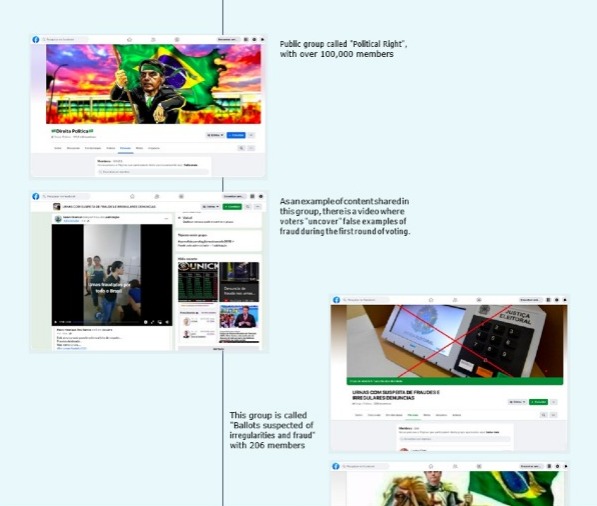
Further Examples
TIKTOK CONTENT PUSHING ELECTION DISINFORMATION
This video consists of out of context segments of Lula speeches talking about electronic ballot
security systems. The video uses these clips to say that there is proof that the electronic ballots can be rigged. The video had amassed over 626K views and over 45K likes before it was taken down.
https://www.tiktok.com/@roniporto_/vi- deo/7151420623938440454?is_from_webapp=v1&item_ id=7151420623938440454&web_id=7146032363180574213
This video shows out of context footage from a speech by presidential candidate Ciro Gomes to "prove" that the first round of elections was robbed in order to favor Lula. The text alongside the video says, "There was fraud indeed. It is mathematically impossible for Lula to be in front of Bolsonaro (...)
It doesn‘t make sense!". This video has over 655K views and over 94K likes.
https://www.tiktok.com/@imensoclips/vi- deo/7150181033432894726?is_from_webapp=v1&item_ id=7150181033432894726&web_id=7146032363180574213
In another video, this popular TikToker makes funny faces over an article in order to throw doubt over elec- toral court actions. The video has over 2 million views and over 63K likes. This TikToker has created hundreds of videos like this over the course of recent months.
https://www.tiktok.com/@opatria/vi- deo/7142534990776012038?is_from_we- bapp=v1&item_id=7142534990776012038&web_ id=7146032363180574213

ENDNOTES STOP THE STEAL 2.0: HOW META AND TIKTOK ARE PROMOTING A COUP

